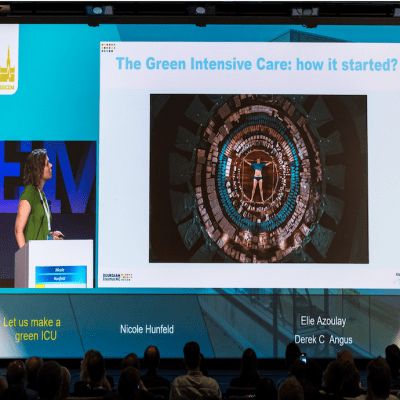Among mechanically ventilated patients with chronic obstructive pulmonary disease (COPD) and metabolic alkalosis, administration of the respiratory stimulant acetazolamide did not significantly reduce the duration of invasive mechanical ventilation, according to a study published in the February 2 issue of JAMA.
As patients with COPD may still require invasive mechanical ventilation when noninvasive ventilation fails, acetazolamide is used as a respiratory stimulant for patients with COPD and metabolic alkalosis. This study reports the results of a randomised controlled trial.
Christophe Faisy, MD, PhD, from the European Georges Pompidou Hospital, Paris, and colleagues randomly assigned 382 patients with COPD who were expected to receive mechanical ventilation for more than 24 hours to acetazolamide (500-1000 mg, twice daily) or placebo, administered intravenously in cases of pure or mixed metabolic alkalosis. Treatment started within 48 hours of ICU admission and continued for a maximum of 28 days; The study was performed from October 2011 through July 2014 in 15 ICUs in France. The primary outcome was the duration of invasive mechanical ventilation via endotracheal intubation or tracheotomy.
380 patients completed the study. For the acetazolamide group (n=187), compared with the placebo group (n=193), no significant between-group differences were found for median duration of mechanical ventilation (-16.0 hours), duration of weaning off mechanical ventilation (-0.9 hours), or for other respiratory parameter-values (respiratory frequency, tidal volume, and minute ventilation), although daily changes of serum bicarbonate and number of days with metabolic alkalosis decreased significantly more in the acetazolamide group.
Secondary outcomes, such as adverse events, use of noninvasive ventilation after extubation, the duration of ICU stay, and in-ICU mortality, did not differ significantly between groups.
The authors note that the primary finding of this study (duration of invasive mechanical ventilation) must be considered cautiously, and they assert that the study may have identified a clinically important benefit of acetazolamide for the primary end point that did not demonstrate statistical significance because of a possible lack of power.
Image credit: Wellcome Library under CC-BY licence
As patients with COPD may still require invasive mechanical ventilation when noninvasive ventilation fails, acetazolamide is used as a respiratory stimulant for patients with COPD and metabolic alkalosis. This study reports the results of a randomised controlled trial.
Christophe Faisy, MD, PhD, from the European Georges Pompidou Hospital, Paris, and colleagues randomly assigned 382 patients with COPD who were expected to receive mechanical ventilation for more than 24 hours to acetazolamide (500-1000 mg, twice daily) or placebo, administered intravenously in cases of pure or mixed metabolic alkalosis. Treatment started within 48 hours of ICU admission and continued for a maximum of 28 days; The study was performed from October 2011 through July 2014 in 15 ICUs in France. The primary outcome was the duration of invasive mechanical ventilation via endotracheal intubation or tracheotomy.
380 patients completed the study. For the acetazolamide group (n=187), compared with the placebo group (n=193), no significant between-group differences were found for median duration of mechanical ventilation (-16.0 hours), duration of weaning off mechanical ventilation (-0.9 hours), or for other respiratory parameter-values (respiratory frequency, tidal volume, and minute ventilation), although daily changes of serum bicarbonate and number of days with metabolic alkalosis decreased significantly more in the acetazolamide group.
Secondary outcomes, such as adverse events, use of noninvasive ventilation after extubation, the duration of ICU stay, and in-ICU mortality, did not differ significantly between groups.
The authors note that the primary finding of this study (duration of invasive mechanical ventilation) must be considered cautiously, and they assert that the study may have identified a clinically important benefit of acetazolamide for the primary end point that did not demonstrate statistical significance because of a possible lack of power.
Image credit: Wellcome Library under CC-BY licence
References:
Faisy C, Meziani F, Planquette B et al. (2016) Effect of acetazolamide vs placebo on duration of invasive mechanical ventilation among patients with chronic obstructive pulmonary disease: a randomized clinical trial. JAMA, 315(5):480-8. doi: 10.1001/jama.2016.0019.
Latest Articles
Acetazolamide, Mechanical ventilation, RCT, ICU
Results of RCT on Study: Acetazolamide Did Not Reduce Mechanical Ventilation Duration for COPD Patients



























